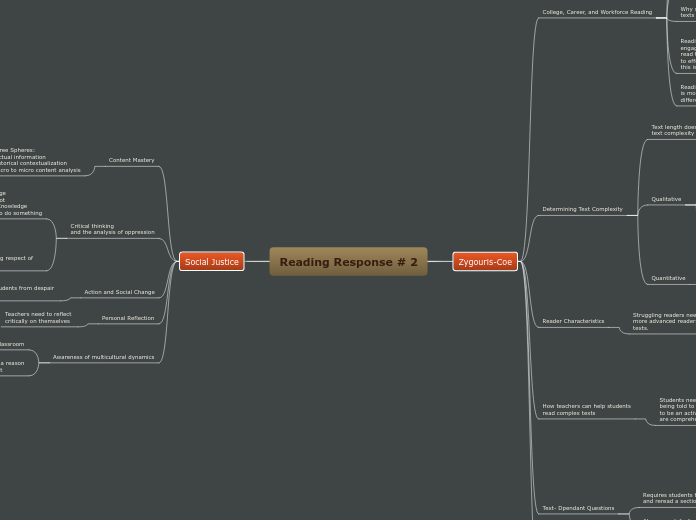Reading Response # 2
Zygouris-Coe
College, Career, and Workforce Reading
Common Core Standards
are focusing on reading discipline
specific texts to ensure a higher
level of understanding within complex
text
Students must read more informational
and complex text as they get older in order
to be college and career ready
Why student do not know to to read complex
texts
Teachers do not
effectively know how
to teach discipline specific
reading without training.
Some teachers often
teach how to skim read to
find the main details or answers
Reading choice is good to get students
engaged, but students need to be able to
read the complexity of a textbook to be able
to effectively read and learn in different disciplines
this is a necessary skill for college and workforce tasks
Reading between the line study shows that a student
is more likely to succeed in college if they are able to read
different type of complex texts.
Determining Text Complexity
Text length does not determine
text complexity
Qualitative
More complex literacy text have more
than one level of meaning. More complex
informational text usually do not have a clear
purpose.
Text Structure-
Narative text includes fiction that
portrays human behavior it includes settings and
events.
Informational Text -
this type of text often times tries to persuade a reader
of something. Structure - description, cause and effect,
comparison and contrast
Text with low level complexity have simpler text structure
Language conventionality and clarity
Texts that rely on figurative, ironic, metaphorical
and ambiguous language tend to be more complex
Quantitative
Use algorithms to asses text complexity
Flesch–Kincaid-
The formula states that
the longer the sentence
and the more words
the harder it is to read
Dalle- Chall Readability formula-
the assumption that the more
familiar the word the easier it is.
less familiar the harder the word
Lexile framework - rate the reader
and the text.
Traditional readability formulas can
only measure the text
Reader Characteristics
Struggling readers need more simpler text
more advanced readers can take on more complex
texts.
How teachers can help students
read complex texts
Students need to me mentored instead of
being told to simply read it. There needs
to be an activity to assure that students
are comprehending what they are reading
Close reading of complex text-
reading like a detective. This is not
independent reading it is guided reading.
Students can read it alone and then with
teacher or peers make sure they understood
what they were reading.
step 1- start out with reading
a small passage from text
Step 2- read the section aloud
and have the students follow along
Step 3- have students read again
while telling them there will be text
dependent questions that go along
Text- Dpendant Questions
Requires students to go back over the reading
and reread a section to come up with an answer
Also can ask feelings about the text
Accountable Talk
Accountable talk is used for class
discussion. This can help student
by hearing from the teacher and
peers.
evidence based discussion will force
students to go back and find facts from
the text to support their claim
Social Justice
Content Mastery
Three Spheres:
Factual information
Historical contextualization
Macro to micro content analysis
Having content mastery can ensure
students can effectively research
key issues
Critical thinking
and the analysis of oppression
Just having knowledge
of something does not
translate into deep Knowledge
or motivate people to do something
Four key points in critical thinking:
Reading multiple different prospectives,
having a broader range of experiences,
analyzing the effects of power and oppression,
Inquiring about alternative methods while having respect of current system.
Action and Social Change
Move students from despair
to hope.
Personal Reflection
Teachers need to reflect
critically on themselves
Awareness of multicultural dynamics
Understanding the different cultures within the classroom
The make up of the classroom is not a reason
to not teach a critical thinking subject
